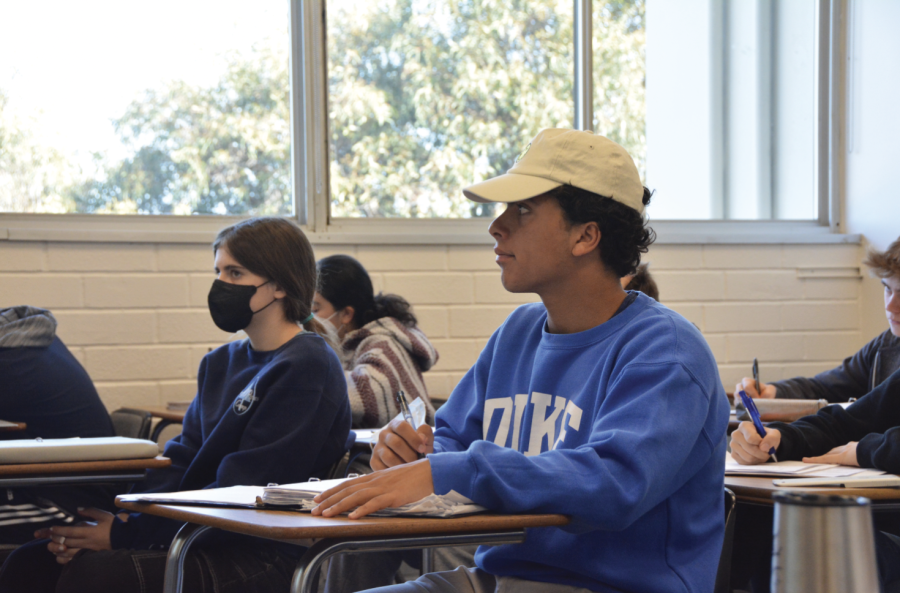FAC delays vote on weighted GPA proposal
September 28, 2022
The Faculty Academic Committee (FAC) chose not to vote on a proposal from the Upper School Dean Team to add weighted GPAs to seniors’ transcripts this year, effectively postponing consideration of the addition to next year at the earliest.
Head of Upper School Beth Slattery said although deans assumed the proposal would be approved for this year, FAC wanted to take more time to consider the new policy’s potential impacts.
“The deans thought that this would kind of be a no-brainer and that it wouldn’t be a big deal to anybody because it was more about college stuff, but I think the biggest thing the department chairs felt was that we want to make sure we are doing it with all of the information,” Slattery said. “This is the first they had heard of it, and it seemed like we made this big decision three years ago to do it one way, and we’re not going to, in an afternoon, decide to flip that switch.”
80% of 94 seniors polled by The Chronicle said they would like both their weighted and unweighted GPA to be included in their transcripts this year, and 87% of the 149 sophomores and juniors polled said they would want the same policy for their senior year transcripts.
Slattery said FAC thought a last-minute addition of weighted GPAs to seniors’ transcripts would be unfair to students who chose courses with the assumption that GPAs would be unweighted.
“It fell to the fact that it was a little bit of a bait and switch to seniors who had made decisions based on information we had given them about it just being an unweighted GPA and that it would not be appropriate to, in September, decide that we were going to change that,” Slattery said.
Communications Department Head Jen Bladen said the possibility of inconsistencies between students made FAC hesitant about adding weighted GPAs to transcripts. She said some seniors have already sent transcripts with only unweighted GPAs to colleges.
“Official Harvard-Westlake transcripts have already gone out without weighted GPAs on them, so no changes can be made this year, and we tabled the discussion until we have more time,” Bladen said.
FAC Chair and Science Teacher Heather Audesirk said the deans’ proposal was intended to give colleges more information about applicants from the school.
“The reasoning behind the proposal included but was not limited to the fact that in the wake of the pandemic, the number of applications received at many colleges increased dramatically, which meant that not all have the time to recalculate GPAs for all transcripts they receive,” Audesirk said. “This means that if some schools provide a weighted GPA and others don’t, those that don’t might not be viewed in the same category as those that do. In addition, without weighting on GPAs, the vast majority of HW students end up in the 3.5-4.0 range, which makes it difficult to distinguish between students in that range without taking time to look at their transcripts in detail.”
Audesirk said FAC will continue to deliberate over the addition of weighted GPAs throughout the year, along with considering other academic policies that could be issued concurrently.
“The vast majority of the committee was in favor of continuing discussions on the topic, and potentially introducing a new Honors and [Advanced Placement (AP)] maximums proposal at the same time, rather than voting at this time,” Audesirk said. “While the deans weren’t entirely in favor of this decision, they said that they understood the reasons that we weren’t ready to make this decision now.”
Slattery said many colleges students apply to would not use weighted GPAs provided by the school but that others need them to distinguish between levels of rigor in students’ schedules.
“It is not really that difficult for the selective places because they have been doing this a long time, and they can eyeball a transcript and understand the differences, but nowadays, with schools getting more and more applications, they don’t have as much time to spend on any individual kid,” Slattery said. “They need us to do some of the work for them, and we stopped doing some of the work for them.”
The pandemic also impacted college admissions offices, making additional transcript information ideal for colleges, according to Slattery.
“There was a lot of turnover at admission offices, particularly during COVID, so you don’t have as many places that know us as well,” Slattery said. “You have somebody who is 24 years old and just started working at an admissions office. They are not from California. They have never heard of Harvard-Westlake, and so we worry that we would potentially be putting students at a disadvantage.”
Slattery said despite the potential utility of adding weighted GPAs to transcripts, she is not concerned about students’ chances in the college process being affected by FAC’s decision not to vote on the proposal.
“Our outcomes last spring did not demonstrate that having the unweighted GPA was a disadvantage,” Slattery said. “We had a really good year, and we think we’ll have one more year of that, so that next year’s seniors can make decisions with the full amount of information.”































